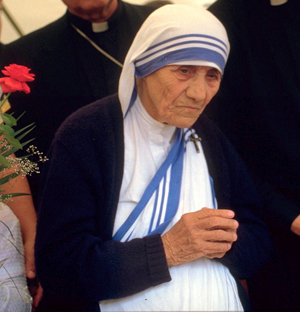By Debie S. Thomas "Come Away with Me" for Journey with Jesus
Debie relates a recent visit to Calcutta India to the Gospel reading this week 
"One of the visits my family made in Calcutta is to "Mother House," the headquarters of the Missionaries of Charity, and the home where Mother Teresa lived, served, died, and is now laid to rest. We saw the tiny bedroom where she slept from the 1950s until her death in 1997. We saw her tomb, now a place of pilgrimage and silent meditation for people of all faiths. We saw countless photographs of Mother Teresa out among the poor she spent her days and nights serving. Jostling crowds. Outstretched hands. Noisy and desperate petitions. An endless cacophony of need.
"Ten years after her death, Mother’s Teresa’s private letters to her spiritual advisors were published in a volume entitled, Come Be My Light, and the struggle those letters revealed shocked both admirers and critics of Calcutta’s 20th-century saint. Contrary to popular belief, Mother Teresa did not enjoy perpetual — or even frequent — spiritual bliss as she went about doing the "Lord’s work." Instead, she experienced despair, doubt, loneliness, and the seeming abandonment of God. Her "dark night of the soul" lasted for decades.
" Often in her letters, she berated herself for this "darkness," until finally, she came to believe that God was allowing her to identify intimately with the suffering of those he had called her to serve. For Mother Teresa, compassion was neither straightforward nor comfortable. It was birthed in her at great cost. Wrenched from her through darkness and pain.
" My own in-laws have served as missionaries in Calcutta for close to five decades. My father-in-law’s efforts to share Christ’s love with his adopted city have been tireless. As a preacher, a mentor, a Bible School principal, and an evangelist, he has blessed more people than any of us in the family can count. Meanwhile, the needy strangers my mother-in-law has welcomed, fed, sheltered, and mothered over the years number in the thousands. Growing up, my husband often called his home, "Grand Central Station." It was perpetually full of guests.
" Despite their age and physical frailty, my in-laws refuse to slow down. "The needs are too great," my father-in-law tells us when we encourage him to consider retirement. "There’s still so much work to do."
" In some ways, I envy him the stark acuity of such need. Here, in my cozy middle-class American life, it’s too easy to pass the buck on compassion. Whether I’m looking at the needs of my own family, my seemingly self-sufficient neighbors, or the wider community, it’s tempting to tell myself that nothing urgent is at stake. Everything can wait. After all, I’m not the last stop, am I? Not much depends on me.
" Or does it? I think this week’s Gospel reading is about the ongoing and necessary tension between compassion and self-protection. Guess what? Jesus lived with this tension, too.
" On the one hand, he was unapologetic about his need for rest and solitude. He saw no shame in retreating when he and his disciples needed a break.
" On the other hand, he never allowed his weariness to overwhelm his compassion. Unlike me, he realized that he was the last stop for those aching, desperate crowds — those sheep without a shepherd. Unlike me, his personal boundaries were finally less important to him than his desire to love others.
" Is there a lesson here? I’m not sure. Strive for balance? Recognize weariness when you feel it? Don’t apologize for being human? Take breaks?
" Yes. All of those essential things. But maybe also — and most importantly — this: We live in a world of dire and constant need. Sheep die without their shepherds. There are stakes, and sometimes, what God demands of our hearts is costly.
" While balance remains the ideal, it won’t always be available in the short-term. Sometimes, we will have to "err." We’ll have to bend out of balance.
" If that happens, what should we do? In what direction should we bend? If this week’s Gospel story is our example, then the answer is clear. Err on the side of compassion. Jesus did."
